|
Blood in the semen is often a benign condition, and will probably disappear on its own, particular in men under 40 years old. When the semen fluid looks pink, red, or brown color or has blood clots, it may indicate that the male genital tract has inflammation, infection, blockage or injury. Blood in the semen is a symptom, which can be due to many conditions affecting the male genitourinary system, such as:
 |
prostate-gland biopsy and vasectomy |
 |
inflammation of the prostate, seminal vesicles or urethra |
 |
traumas such as vigorous sexual activity or a trouser-zip accident |
 |
infections such as sexually transmitted diseases |
 |
abnormal growths in the urethra, prostate, bladder or testes |
 |
ejaculatory duct obstructions |
 |
bleeding disorders |
 |
side effects of medications |
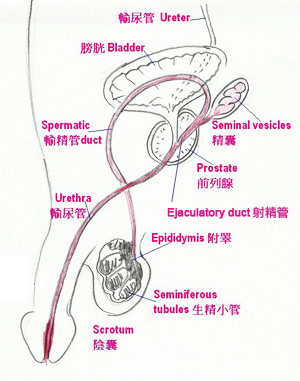 |
The male genital tract |
If you are over 40 and notice any blood in the semen, you should consult an urologist immediately. For men under 40 years old, visit your doctor if:
 |
there is a lot of blood in the semen, or it appears in frequent episodes. |
 |
you have other symptoms such as genital or urinary pain, pain with ejaculation, low back pain, fever, swelling and tenderness in the scrotum, or blood in the urine. |
 |
you have other risk factors, such as a history of cancer, bleeding problem, trauma, genital and urinary system malformations. |
 |
you have unsafe sex that puts you at risk of sexually transmitted diseases. |
You doctor may recommend urinalysis and culture, semen analysis, prostate digital exam, ultrasound of pelvis and scrotum, or endoscopy to identify the possible cause of bleeding as well as to guide the treatment. In some cases, blood in the semen appears in recurrent episodes, but the cause remains unknown despite a full investigation. Doctors may give no medical treatment but follow-up observation, then TCM might provide an alternative relief.
In traditional Chinese medicine (TCM), semen is regarded as a kind of body essence, the place that transforms, stores and excretes seminal fluid is called essence chamber. It is claimed that the kidneys and liver play important roles in controlling the functions of the male external genitalia. As kidneys store essence, dominate reproduction and control the anterior and posterior orifices (urethra and anus); the Liver Meridian circulates around the external genitalia and controls their actions. Blood in the semen is closely related to the conditions of the kidneys and liver. The problem is commonly seen in young and middle-aged men, individuals may also present with pain in external genitalia, pain with ejaculation or a reduced amount of seminal fluid. Factors contributing to bleeding in the essence chamber include overindulgence in sex, physical strain, unhealthy eating habits, injuries or infections, which damage the essence chamber directly or weaken the internal organs in controlling over the essence chamber, resulting in blood leaking out and mixing with the semen.
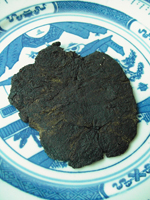 |
|
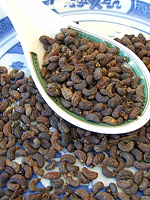 |
|
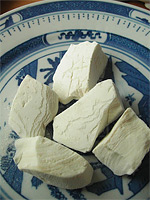 |
| rehmannia root |
|
glossy privet fruit |
|
cuttlefish bone |
1. Herbal prescriptions for blood in the semen
Herbal treatment for blood in the semen is guided by principles for bleeding symptoms, which employ methods such as cooling blood, nourish blood, replenish qi or activate blood to stop the bleeding. In addition, the underlying disharmony should be identified and treated accordingly. Below are the common disharmony patterns that involve blood in the semen.
Yin deficiency leading to virtual fire
Bright red blood mixed in sticky semen, individuals may also accompany with pain with ejaculation, distending and retracting sensations in the groin area, lumbar soreness, knee weakness, excessive libido, nocturnal emission, warm palms and soles, dizziness, ear ringing, night sweats, irritability and mouth dryness. The tongue is red with little coating, and the pulse is thready and rapid. The remedy should aim to nourish yin, check virtual fire, cool blood and stop bleeding.
Sample prescription: Great Tonify the Yin Pill plus glossy privet fruit, yerbadetajo herb, pagoda tree flower, thistle herbs, couch grass rhizome and rehmannia root
Damp-heat in lower burner
Dark red or brown colored semen, individuals may accompany with pain with ejaculation, distending pain in the lower abdomen, testes or groin area, wet and itchy scrotums, or pain and itchiness in the penis. There may also have pain and burning sensations during urination, irritability, a bitter taste in the mouth or mouth dryness. The tongue is red and covered by yellow greasy coating, the pulse is taut and rolling. The remedy should aim to clear heat, promote urination, cool blood and stop bleeding.
Sample prescription: Gentian Liver-Purging Decoction plus thistle herbs, yerbadetajo herb, couch grass rhizome and oriental arborvitae leafy-twig
Blood stasis obstruction
Dark red colored semen, or blood clots in the semen, individuals may accompany with stabbing pain with ejaculation, distending pain in the lower abdomen, insomnia or dream-disturbed sleep, and depression. The tongue is dark-purplish, or has purple spots on it, and the pulse is deep and hesitant. The remedy should aim to activate blood, resolve stasis, unblock blood vessels and stop bleeding.
Sample prescription: Remove Stasis in the Blood System Decoction plus couch grass rhizome, notoginseng, glossy privet fruit, yerbadetajo herb and hairyvein agrimonia herb
Qi deficiency failing to retain blood
Pink colored and thin semen, individuals may accompany with low libido, pale complexion, fatigue, general weakness, sweating, poor appetite, abdominal distention and loose bowels. The tongue is pale and the pulse is thready and deep. The remedy should aim to replenish qi(vital energy) and reinforce its ability to astringent blood.
Sample prescription: Tonify the Middle & Augment the Qi Decoction plus dodder seed, himalayan teasel root, fossil bone and cattail pollen
2. Topical applications for blood in the semen
In case of blood in the semen, herbal decoctions along with topical applications can quicken the healing process and ensure overall recovery. Topical applications work directly on the targeted body parts, in which they inhibit inflammation, improve blood circulation, and promote tissue repair and regeneration. The selected herbs are mostly for clearing pathogens such as heat, damp-heat, and virtual fire, resolving blood stasis and unblocking the urinary and male genital tracks, so as to relieve localized symptoms like swelling and pain.
Herbal enema: herbs are prescribed after detailed consultation. Soak the herbs with 600ml to 800ml water for 30 minutes, simmer until the liquid remains about 150ml, then filter into an appropriate container and cool into 39℃, and prepare for infusion into the intestine. The solution should stay in for two hours or longer depending on the individual conditions. Do this daily, ten times as one course.
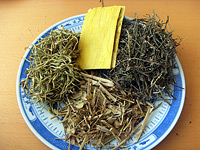 |
Amur corktree bark, barbed skullcap herb,
honeysuckle flower and patrinia herb |
 |
Amur corktree bark (15g), barbed skullcap herb (15g), honeysuckle flower (15g) and patrinia herb (15g) |
 |
Dandelion (30g), Tokyo violet herb (30g), couch grass rhizome (20g), pyrrosia leaf (20g), and Chinese honeylocust spine (12g) |
 |
Dandelion (20g), wild chrysanthemum flower (20g), patrinia herb (20g), sopora root (15g), giant knotweed rhizome (15g), Chinese rhubarb (10g), corydalis rhizome (15g) and zedoray rhizome (10g) |
Herbal soaking and washing: when preparing the decoctions, first soak the herbs for 20 minutes and then boil for 30 minutes. Keep the water temperature at around 42℃, soak and rub the groin area for at least 30 minutes, and wipe properly after soaking. Do this once daily, seven days as one course.
 |
Honeysuckle flower (15g), dandelion (15g), Tokyo violet herb (15g), red peony root (15g), peony root bark (15g), frankincense (15g), myrrh (15g), Chinese safflower (15g), peach kernel (5g), and weeping forsythia capsule (16g). |
 |
Sodium sulfate (30g), motherwort herb (30g), snakegourd root (30g), green onion stalk (30g), Chinese rhubarb (10g), Dahurian angelica root (10g), argy wormwood leaf (10g) and plantian herb (10g) |
 |
Amur corktree bark (20g), rehmannia root (30g), anemarrhena rhizome (15g), red sage root (30g), red peony root (15g), Chinese safflower (30g), earthworms (15g), motherwort herb (30g), dandelion (15g), patrinia herb (15g), sopora root (15g), and Chinese rhubarb (15g) |
Besides the above methods, physicians may also suggest massage, herbal dressing, medicinal suppository and acupuncture for individuals with blood in the semen. A comprehensive treatment plan can meet the health needs individually.
3. Home care advice for blood in the semen
Generally speaking, persistent or recurrent blood in the semen often indicates that the genitourinary tract has inflammation, which in TCM understanding, is associated with damp-heat, heat or blood stasis in the lower burner. Intense sexual activities, alcohol, spicy and hot foods do not favor the recovery from these pathological conditions, and thus should be limited. A regular bowel habit and proper posture can also prevent the pelvic region from congestion. For the daily meals, individuals should eat foods that help clear the pathogens, cool blood, invigorate the kidneys and liver, and promote circulation in the lower burner. Below are recipes for blood in the semen.
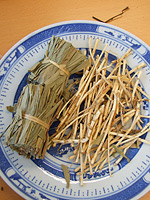 |
Couch grass rhizome and
lophatherum herb |
 |
Crap soup: Common crap fish (one about 500g, cleaned) and box tofu. Add vegetable oil in a heated wok, spread ginger flakes on the wok, add fish and pan-fry 3 minutes for each side, then pour in 1000ml hot water, put in tofu, lower the heat and allow the ingredients to remain at a brisk simmer until the soup turns silky white. Turn off the heat, add pepper, salt and green onion to taste. Sever hot. |
 |
Black soybean and pig kidney stew: Pig kidney (2 pieces), black soybean (500g), dried tangerine peel (5g), cumin (5g), and fresh ginger (10g, sliced). Wrap the tangerine peel and cumin with a swab. Cut the kidneys in half and devein, slice and marinate them with salt, sesame oil, soy sauce, ginger, rice wine and sugar. Add some vegetable oil in a pot and heat up, put in the kidneys and stir-fry for 2 minutes, add in 800ml water, the black soybean and herbs, bring to a boil and then lower the heat, simmer for about 2 hours. Add salt to taste, the dish can be divided in several meals. |
 |
Lotus root congee: fresh lotus root (250g, cleaned and chopped) and glutinous rice (100g). Boil the lotus root, rice and 1500ml water with a pot, bring to a boil and then simmer until it turns into a thick soup. Turn off the heat and add rock sugar to taste. Eat in the morning and evening. |
 |
Chinese yam and lotus seed congee: dried Chinese yam (30g), lotus seed (30g) and glutinous rice (100g). Wash the ingredients, boil with 1500ml water in a pot, bring to a boil and then simmer until it turns into a thick soup. Turn off the heat and add rock sugar to taste. Eat in the morning and evening. |
 |
Pork tendon and herbal soup: dried pork tendons (80g), suberect spatholobus stem (25g), Chinese red dates (10 pieces) and fresh ginger (15g). Wash the pork tendons and soak in water over night, and then cut into big pieces. Boil the port tendons, herbs, ginger and 2000ml water with a pot, bring to a boil and then simmer in low heat until the tendons are fully tender. Add salt, rice wine and pepper to taste, server hot. Eat the tendons and red dates, and drink the soup. |
 |
Mung bean sprout juice: Squeeze fresh mung bean sprout 500g to make a juice. |
 |
Fresh juice: Fresh lotus root (200g) and fresh couch grass rhizome (200g). Clean the ingredients, chop and squeeze together to make a juice. |
 |
Herbal tea: Couch grass rhizome (10g) and lophatherum herb (5g). Wash the ingredients, place in a cup, infuse with boiling water, and soak for 30 minutes. Serve warm. |
 |
Herbal tea: Couch grass rhizome (25g), green tangerine peel (10g) and liquorice root (10g). Wash the ingredients, and boil with 1000ml water for 30 minutes. Drink in the morning and evening. |
 |
Wax gourd tea: Wax gourd (350g, chopped and don’t peeled) and coix seed (50g). Boil with 2000ml water for 30 minutes. Drink regularly. |
|